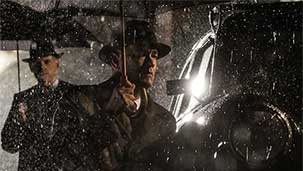And here I thought Kurt Cobain was going to be the most surprising credit of the year.
Seeing your name in the end credits of Steven Spielberg’s Bridge of Spies threw me for a loop. As you are no doubt well aware, Bridge of Spies is only the second Spielberg feature not scored by John Williams. The other was The Color Purple, which was scored by Quincy Jones. I know, I know, you’re a six-time Grammy winner and a 12-time Oscar nominee. You’re certainly not an unknown quantity. But Jones has won 27 Grammys and been nominated 79 times, while Williams has won 5 Oscars, been nominated 44 times, and has also won 22 Grammys himself. You’re stepping in to replace two men who are basically the most recognized artists in your field. That’s a tall step.
And it's not that you don’t have your own impressive film credentials: American Beauty, Finding Nemo, Skyfall, and WALL•E, just to name only a few. But it’s not your pedigree that that makes you an unusual choice. It’s your musical style.
Let’s face it: you aren’t known as being the most emotional of composers. My introduction to your music was Robert Altman’s The Player, where the electronic iciness and ironic detachment was a perfect accompaniment to Altman’s black comedy. And even as you’ve worked on higher-budget, higher-profile productions, you’ve maintained some of that signature aloofness, almost always to the benefit of your collaborators.
And here you are, working with Steven Spielberg, considered by many—unfairly, at times—as one of the most sentimental filmmakers of all time. The natural question is: how does this affect Bridge of Spies? Is a Spielberg movie a different experience when John Williams isn’t delivering his bombastic brass or swelling strings?
Yes. And no.
The music is different. This may be Spielberg’s least-scored film since Saving Private Ryan. It’s a welcome change, as his most recent film, Lincoln – which I loved – leaned too heavily on mawkish cues that it didn’t need. Here, you do your best to maintain some distance from the events onscreen, which gives everything an icy sheen entirely appropriate to a story set during the Cold War.
Though inspired by actual events, Bridge of Spies is a deceptively simple film in terms of plot. In 1957, Rudolph Able, a Russian deep-cover operative, is arrested by the CIA after retrieving a dead drop package. American lawyer James Donovan is asked to defend him—but only just enough to give the appearance of due process. Not long afterwards, US Air Force pilot Francis Powers is captured in Russia while flying a covert operation to film military sites. Donovan is then asked to facilitate a prisoner swap between the two nations, Abel for Powers.
It’s all classic spy stuff, but Spielberg treats it all matter-of-factly and without fuss. Although it’s beautifully shot (by Janusz Kaminski, of course; Williams is the only of Spielberg’s regulars absent here), one would be hard-pressed to find what could be called “typical” Spielberg shots; there’s nary a Spielberg Face to be found. Even Tom Hanks subdues his natural warmth and charisma, playing Donovan as a man more annoyed than honored by his nation’s call to duty.
And this, Thomas, is why your music fits so well.
Bridge of Spies is an inward-looking film. It’s telling that the first shot of the film is one of Able peering into a mirror, studying his own face. This is a story about the way we see ourselves – as people, as nations – and how we present ourselves to the world. Able may be a spy, but he is an honest one: once caught, he readily admits who he is and what he’s done. He’s not going to give up any Soviet secrets, but he’s also not going to pretend he doesn’t have them. For Donovan, this is far more admirable than what his own government is asking. His own moral compass won’t let him do what his country demands, and must deal with the consequences of the way this action (or inaction) is perceived.
You music takes it’s cue from Able: quiet, introspective, but sure of its place and purpose. It doesn’t need to be showy. And Like Mark Rylance’s superb performance as the captured spy, it puts us at a remove, free of emotional manipulation. And that’s no small feat.
Sincerely,

Casey







